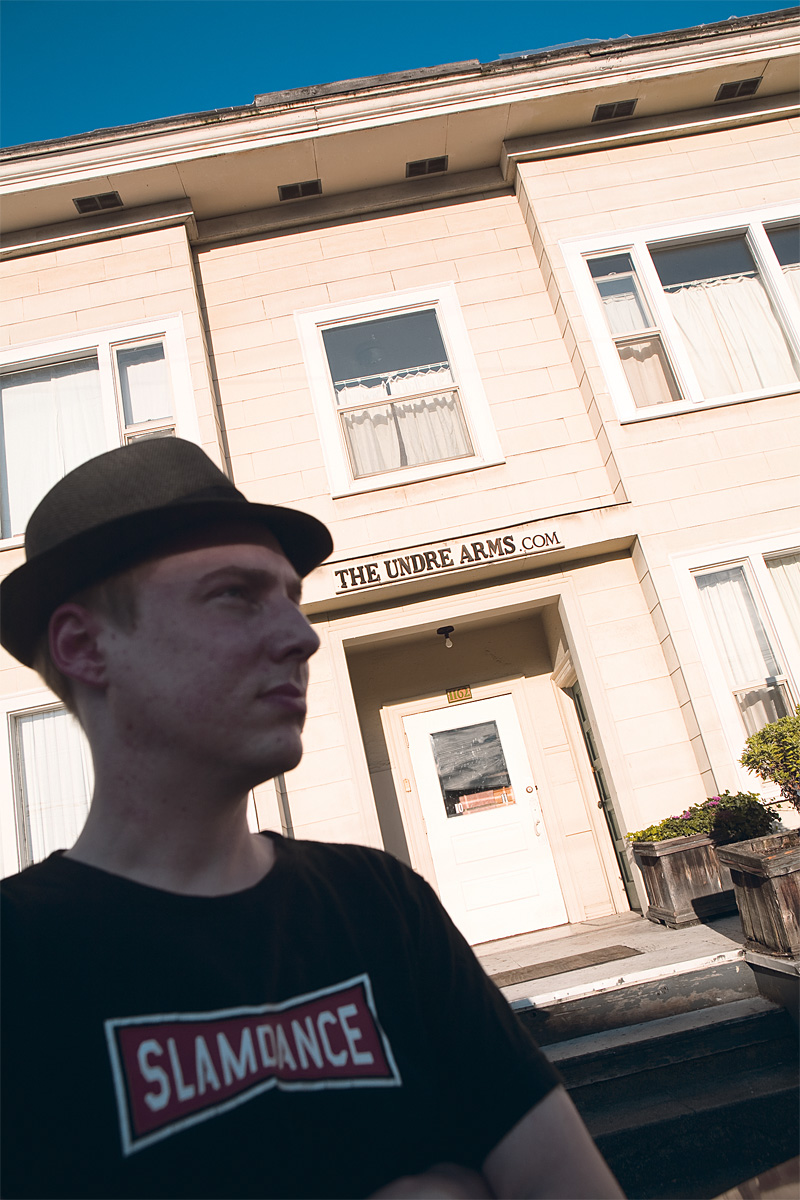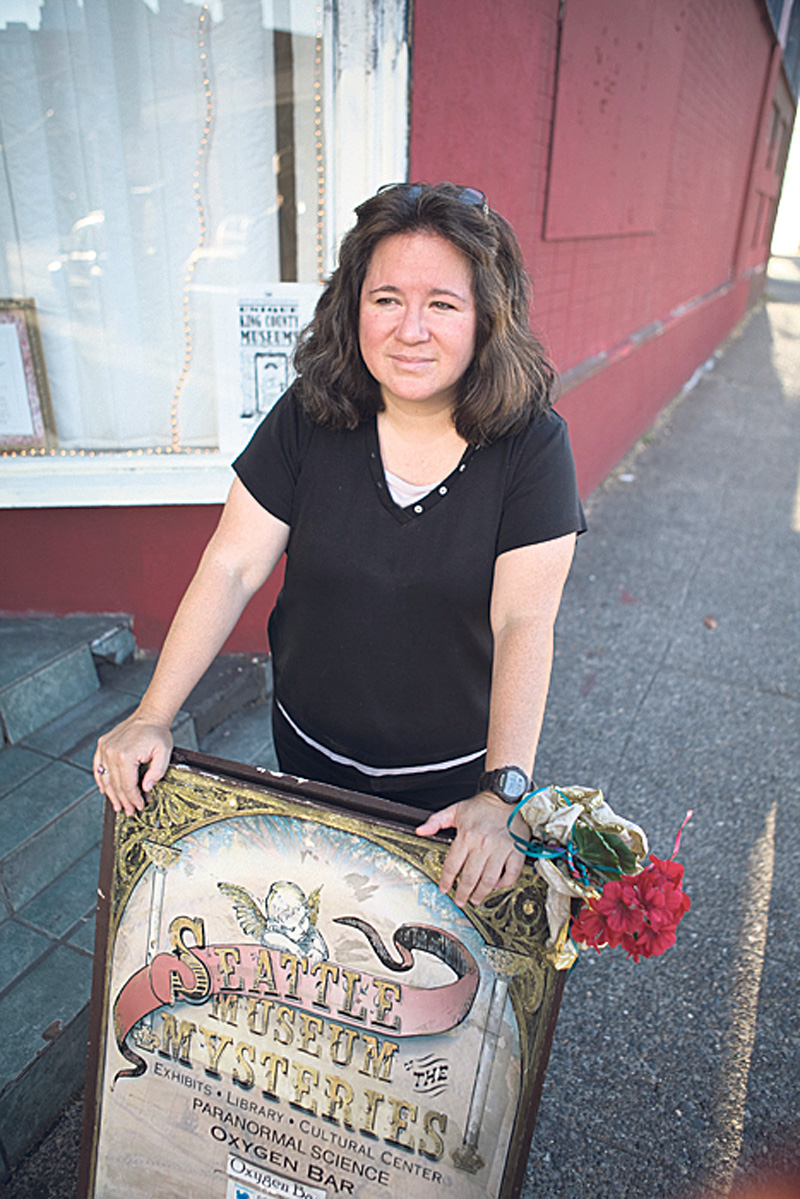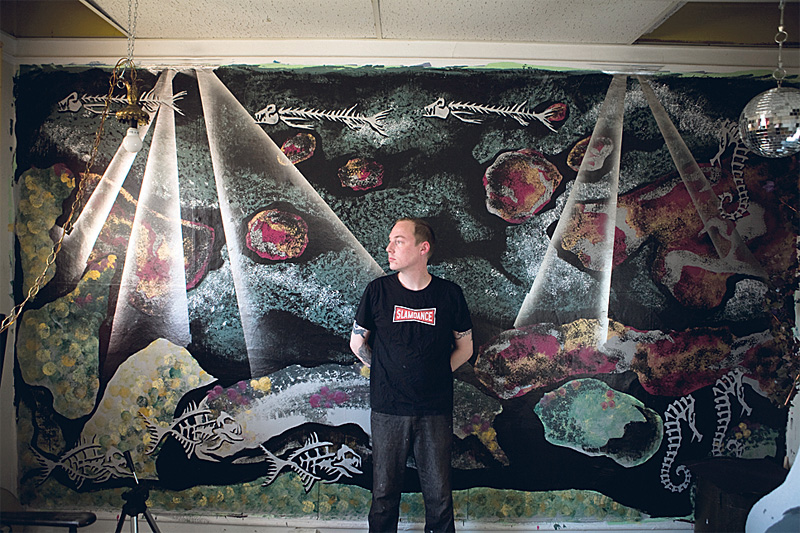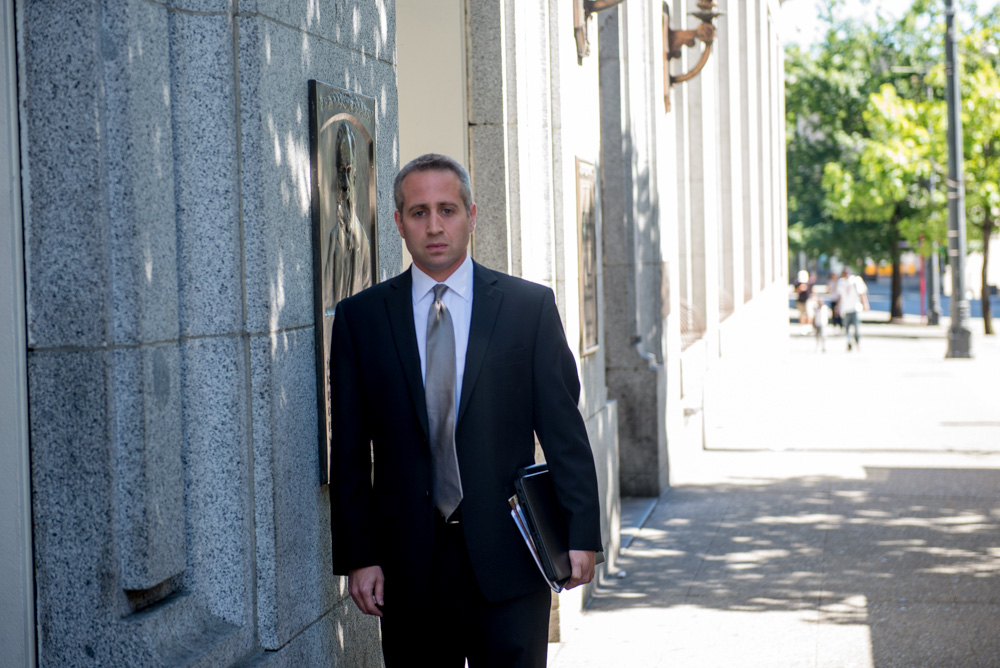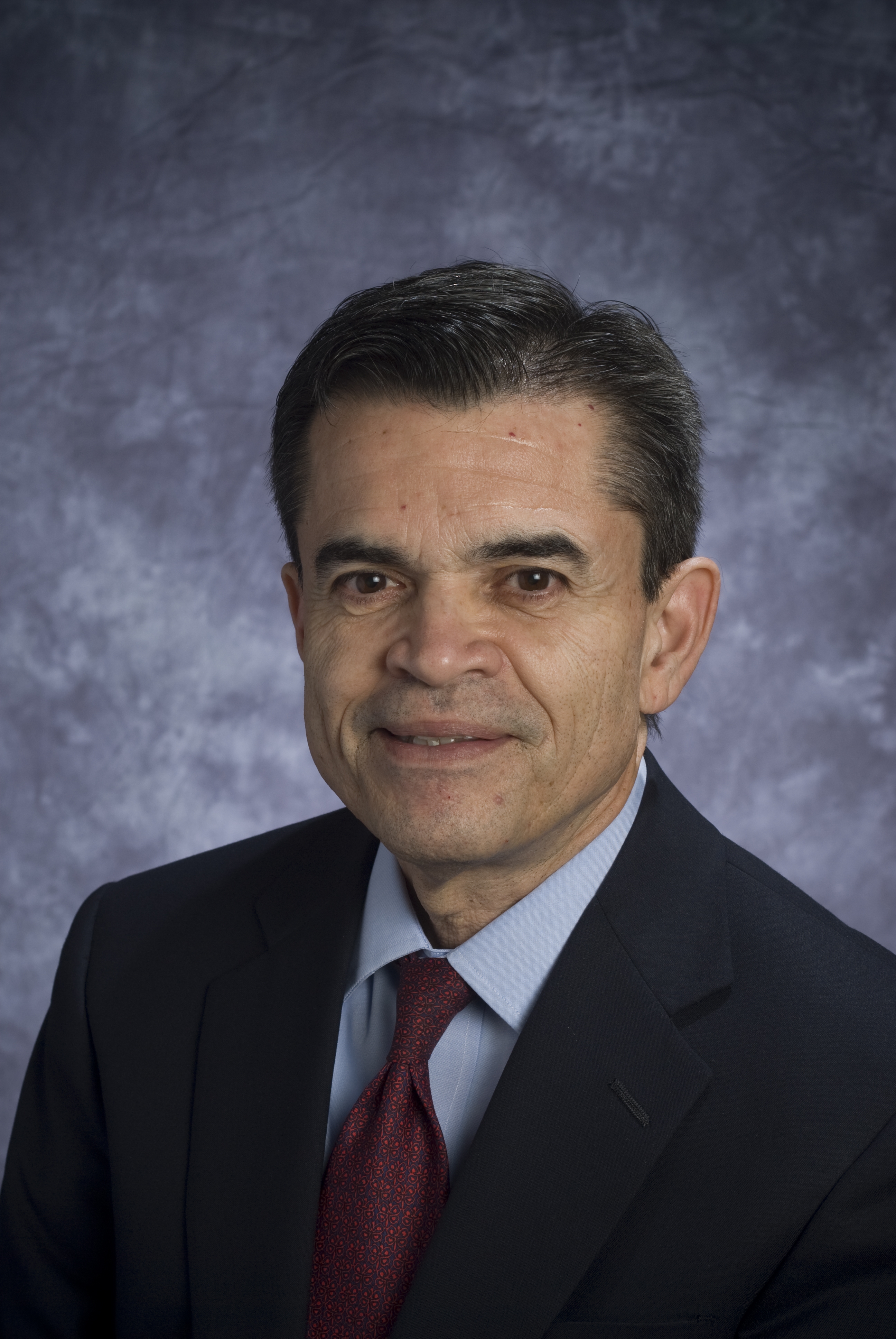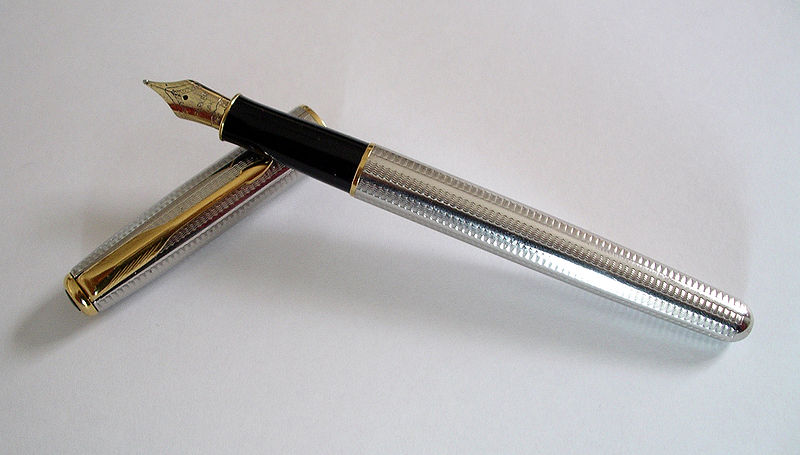At 4 a.m., a wiry figure appears out of the shadows behind the Undre Arms Apartments on Capitol Hill. It’s Marty McDermott, who picks up a spent beer can from the sidewalk out front and does a lap around the building, presumably to check on whether it’s survived the second day of Block Party mayhem.
When a few drunk kids cross his path, McDermott, a self-identified hobo with a straggly length of beard and just a couple surviving teeth, gleefully cackles a greeting: “I’m like a rooster out here—cock-a-doodle-damn-doo.”
On McDermott’s cap, which he made himself, there’s a small, loosely fastened baby figurine. As he heads to his regular morning gig clearing trash from the Pike Street & Broadway Shell station’s parking lot, he explains after some prodding that the figurine is a symbol of his staunch belief in Catholic doctrine opposing abortion. It’s also the cap he wears to weekly protests at Planned Parenthood’s Madison Street clinic. McDermott, who at 63 looks like a more weathered version of Willie Nelson, doesn’t care that, on über-progressive Capitol Hill, an anti-choice stance makes him an oddball.
“Fuck anybody that has a problem with it,” he says, defiantly.
Between trips to the dumpster, he shares stories of his past lives: hippie, tramp (the hitchhiking kind), cab driver, and house painter. He picked peyote bulbs in south Texas. He managed a music venue in Austin. Of course, that was before the “Jew-boys and gaysters took over and drove everyone out the industry.”
When pressed, McDermott makes no attempt to apologize for his colorful language. Being a “white-boy warrior preacher” who has been “sucking hind-tit” his entire life, his task is to tell it like it is. While working odd jobs to survive, he lives in the Undre Arms’ basement, where he’s bunked off and on rent-free since meeting the residence’s former owner, Paul McKillop, at a Catholic mass for the homeless around 25 years ago.
The Undre Arms is not included in the city of Seattle’s database of historical properties. It is, however, considered by some a landmark—though as Michael Wells of the Capitol Hill Chamber of Commerce puts it, “not necessarily the kind of landmark people love.” It’s the beige, decrepit, two-story apartment building that sits on the wedge-shaped island at the nexus of Union and Madison Streets and 11thAvenue. The complex has a home on the World Wide Web at theundrearms.com, a bare-bones site started by one of the tenants that reads: “We, the residents of the charmingly ratty Undre Arms, are not responsible for the opinions held by our landlord, who is the one with ‘the sign’ in Apt. 1.”
Until recently, “the sign”—which read “Abortion Kills Children”— was the Undre Arms’ most memorable feature, conspicuously placed in one of the side windows by McKillop. It’s gone now, replaced after McKillop moved out. After 36 years of owning the place, McKillop sold the Undre Arms in 2007 for a cool $1,873,700 to 11th & Madison, a limited-liability company with ties to Olympia-based construction firm Berschauer Phillips Construction. Two years ago, before the recession really took hold, the company submitted a proposal to the city Department of Planning and Development (DPD) to replace the Undre Arms with a six-story, 105-unit apartment building complete with underground parking and a few thousand square feet of downstairs retail space.
But three years after the sale, the Undre Arms is still standing—a reminder of Capitol Hill’s humbler past, and one of a handful of similarly reprieved buildings that provide a space for people and businesses that might otherwise be pushed out of the neighborhood.
Inside the conference room at the Lifelong AIDS Alliance, located directly across the street from the Undre Arms, director of finance Katherine Kizer shows off framed black-and-white photo prints of what Union Street used to be. One dated 1959 shows the Lifelong building back when it housed the Seattle Tool and Supply Company.
The pictures illustrate an era in Seattle before Capitol Hill became the city’s gay epicenter. In the 1950s, the strip of Union Street that the Undre Arms occupies was home to a string of car-repair shops and other auto-care businesses. Some, like German Auto Repair, are still there. Others, like Complete Auto Care, have changed location, their former homes repurposed and taken over by fledgling restaurants like Po Dog, a mecca for lovers of highbrow encased meats, and its conjoined sports bar, Auto Battery.
Lifelong moved in 10 years ago, and employees and volunteers have been getting voyeuristic entertainment daily from Undre Arms tenants ever since. Notably, there’s the guy who for years could be seen through his first-floor windows in various stages of undress lifting weights, and the thin guy with the tangled beard—McDermott—whom Kizer has seen getting off the bus with his guitar. Then there’s the building itself: “I’m a little surprised that the place hasn’t fallen down yet,” says Kizer.
For just over a century, the Undre Arms has stood mostly unchanged while Capitol Hill has evolved around it. Longtime scenester Marcus Wilson bartends at Pony, a boozy den of homo-hipsters that opened last summer a few blocks east of the Undre Arms. Harboring a long-standing fascination with all things seedy, Wilson says he’s often thought about moving in. McKillop’s sign kept him away—but that doesn’t mean he won’t miss the building if it goes.
Since arriving from Phoenix in 1994, Wilson’s watched all the spots he was once fascinated with—The Gay 90’s and Café Minnie’s, to name a couple—disappear. “In Seattle’s endless pursuit to become a world-class city, it just tears down anything old,” he says.
Some of those buildings wait in a state of semi-demolishment behind metal gates while their owners hope for a market turnaround. Other developers never got a chance to break ground before the economy went to shit, as is the case with the Undre Arms. According to 11th & Madison’s design proposal, construction on the Undre Arms’ replacement was supposed to have begun at the start of the year. But with financiers being less spendy in the wake of the crash, the project—in spite of having been granted a Master Use Permit by the city—has ground to a halt. “The earliest this will go anywhere is next summer,” says Brian Runberg, who owns Runberg Architecture Group, the local firm handling the new building’s design. (11th & Madison did not return multiple calls seeking comment for this story.)
Tenants of the Undre Arms say they haven’t had much interaction with the new owners. In 2009, 11th & Madison sent each resident a letter explaining that the recession had forced a delay in the process of getting approval from the city. If the supposed financial issues persist, there’s no telling when the developers will break ground.
Kirkland developer Seawest Investment Associates is locked in a similar holding pattern. It’s no small thing to finance a mid-scale construction project, says Seawest managing partner Matt Aatai, “and the banks aren’t exactly eager to lend money these days.”
In 2005, Seawest paid $2,700,000 for the purple warehouse located near the intersection of Union Street and Broadway, blocks away from the Undre Arms. On a sunny day, if the light hits it right, you can just make out the lettering on the white DPD sign of death posted outside the warehouse. It’s been painted to match the rest of the building —brown and purple, an apt choice given the state of the economy.
Seawest had planned to build a six-story, 79-unit, mixed-use apartment complex there. Five years have passed, and it’s still a warehouse. In February 2008, the DPD gave Aatai the go-ahead to apply for a construction permit, but he’s still waiting for approval. In the meantime, Seawest has been renting out the building.
Inside, a diminutive woman named Charlette LeFevre flits from picture frame to picture frame, explaining that there is no exhibit of Bruce Lee’s Seattle years save for the one that adorns the walls of the recently relocated Seattle Museum of the Mysteries.
Phillip Larson collects a recommended donation of $3 from those who visit the Museum. Larson is a heavy-browed guy who, when not hunched over the front desk, oversees the Museum’s James Widener Ray Library, named for the local millionaire philanthropist who willed it his collection of books on the paranormal sciences following his death in 2005. LeFevre is the Museum’s curator. Together they sweat inside the Museum’s un-air-conditioned new home, trying to transform a makeshift office by filling it with exhibits on the Pacific Northwest’s unexplained phenomena and objects of obsession, like D.B. Cooper and Frances Farmer.
After six years on Broadway, the Museum moved following a dispute with its landlord over toxic fumes and the tardiness of the monthly rent check. Along with the capoeira studio next door, the group now rents space in Aatai’s warehouse, which could be demolished fairly soon.
Despite the uncertainty, LeFevre says the Museum will stay as long as it can. She won’t say exactly how much the group is being charged for rent, but concedes that “we wouldn’t be able to stay on Capitol Hill at the prices they’re charging now.”
McDermott says the Undre Arms is a haven for “oddballs” and “urchins” like himself. After the workday ends, the building’s tenants hang on its creaky back balcony to escape the summertime heat. Many admit their apartments aren’t in the best repair. But that’s leavened by the low rent, averaging around $700 for a one-bedroom apartment. (Tom Cain of Washington Apartment Insights says the average rent on Capitol Hill is $1,078.)
Affordability is what initially attracted Sam Chesneau to the Undre Arms. He lives in McKillop’s old apartment on the first floor with his 3-year-old son. Three years ago, he was a new father in need of a place relatively close to Seattle Central Community College, where he works as a program coordinator. He found the Undre Arms. Now he’s committed to staying, despite his apartment’s aesthetic shortcomings.
“This is one of the last vestiges of what Capitol Hill living used to be before it got so trendy,” he says. “I’ll be here until they bulldoze the place.”
Mely Andrada moved into the Undre Arms in 1988. She and her husband had left the Philippines and were working in Nigeria when, in 1985, Major-General Muhammadu Buhari’s regime was toppled in a military coup. Afterward, they fled to the U.S. with their two daughters. The Andradas were living with family in Tacoma when a Catholic priest introduced them to McKillop, who offered to let them stay for free in a Capitol Hill house he owned. The family moved into the Undre Arms in 1988 after McKillop sold the home, and for the next eight years they lived in a cramped one-bedroom apartment.
Melissa Andrada, Mely’s 25-year-old daughter, remembers her mother warning her to keep away from the exposed syringes they’d sometimes find scattered on the sidewalks. Despite the neighborhood’s “sketchiness” and the roaches she says have long infested the place, Andrada is happy to have spent her childhood at the Undre Arms. Now living in New York City, she has no immediate plans to move back. If she did, Capitol Hill would not be an option. “It’s way too commercial,” she explains.
Andrada remembers the Undre Arms’ tenants as representing a cross-section of Capitol Hill’s population. “There were artists and students, [and] people who looked like they were just doing nothing at all living there,” recalls Andrada.
Tyson Theroux, who lives on the first floor, is a newer arrival. When he’s not waiting tables at SkyCity, the Space Needle’s restaurant, Theroux is a filmmaker—or as he puts it, “a maker of artistic but cheaply produced weird-ass short films.” When word arrived that the Undre Arms’ new owners expected to tear the place down, he got to work converting his apartment into a studio. His den became the set, and his laundry room stands in for a proper makeup room and wardrobe.
On a humid Wednesday evening, just as the sun is beating down on his apartment’s front window, Theroux and a crew of friends and co-workers cram into his former den. Two of them are positioned behind a backdrop, holding together a cardboard cutout of a monstrous, gape-mouthed fish that’s on the brink of falling apart.
The Ninth House of Prometheus will be a web series about espionage and betrayal set in a fictional world that doesn’t have a name yet. The props are handmade, as are the costumes. Theroux’s friend Steve, dressed in a mockup of a deep-water exploration suit with a plastic, fishbowl-shaped visor, twirls the curls of his mustache while practicing his lines. In today’s scene, he’ll get propositioned by a scaly prostitute while passing by an underwater brothel.
Theroux shoots with a $150 flip camera. It’s positioned in front of a bubbling aquarium to better immerse viewers in the underwater setting. It gives the footage that schlocky feel Theroux covets in all his films. He’s sweating. Everyone is, especially Steve, hamming it up as the series’ heavy.
“Let’s do one more [take],” says Theroux. Dressed in an explosion of purple Spandex and body paint, Theroux’s co-worker Mathias utters the line, “C’mon and get your gills cleaned.” It’s camp. But that’s the vibe that Theroux—the guy behind such short films as The Dead Love, The Dead Lover’s Return, and Dr. Terror’s House of Pancakes, which premiered in 2007 at the Slamdance Festival in Park City, Utah—is going for.
After the shoot, Theroux explains between puffs of a cigarette that for him the sale of the Undre Arms is possibly a sign that “it’s time for me to move on.” He’s 35, but his close-cropped hair gives him the look of a recent college graduate. When and if the new owner’s plan comes to fruition, Theroux says he’ll consider moving to New York, or maybe San Francisco. “But I’m staying until they kick me the fuck out,” he says.
Theroux’s 26-year-old neighbor, Nate Munoz, is in full agreement. At 4 p.m. on a bright Thursday, Munoz, all tousled hair and sprouting whiskers, is sleeping off a hangover. His door is slightly cracked to compensate for the lack of air conditioning. He answers a knock wearing boxers and a T-shirt, then breezily heads back into his room, opting to answer questions from the confines of his bed, while a friend, shirtless and faux-hawked, nods off on a dingy couch.
The night before they had drinks at a bar on Alki Beach, then headed north to a casino whose name he doesn’t recall. “I spent more money than I had to blow,” says Munoz. His furniture is covered with beer bottles, remnants of last night’s post–last call soirée. Or they could be from the night before, says Munoz, since it’s summertime and the after-parties tend to run together.
He signed a six-month lease for a one-bedroom on the first floor last year, and has since taken to paying month to month. As it worked out, he now lives just blocks from his band Out on the Streets’ practice space at the Chop House, a decaying flophouse on 11th and Pike that’s also slated for redevelopment. When the bars close, his apartment’s proximity makes it an ideal location for friends and bandmates to sober up—or continue drinking. Whichever they decide, his apartment is equipped with a breathalyzer, which Munoz holds up proudly after rifling for a minute through some clutter to find it. “We’re all about safety here,” he says.
Munoz admits to being the loudest of the Undre Arms tribe of tenants. A makeshift recording studio is set up in his closet, and he and his friends shot fireworks off the Undre Arms’ front steps on July 4. That got noticed by McKillop, who though no longer living in the building remains the apartment manager, with McDermott acting as his eyes and ears. (McKillop moved into an apartment on First Hill shortly after selling the Undre Arms.)
But Munoz is clearly having too much fun to be overly concerned with his nonagenarian landlord or the Undre Arms’ uncertain future. He hasn’t given much thought to where he’ll go if the Undre Arms gets razed, and shrugs when asked about noise complaints by his fellow tenants, saying only “I don’t know, but Paul has been riding my ass about it.”
Veronica Desaram has known Paul McKillop for the 15 years that she’s owned the Copy Mart located across the street from the Undre Arms. Asked about him, she affectionately calls him a grumpy old penny-pincher who “wants all the information, but who won’t give out any.”
On the official papers documenting the deed transfer from McKillop to 11th & Madison, the reason cited for the sale is “old age.” In our nine-minute interview, McKillop confirms that he went looking for a buyer because after 30 years he was “tired of the business.” But he’s loath to answer questions about the building’s condition, past or present.
What McKillop will speak of, if you’re interested in Undre Arms history, is how much King County’s property records suck. “They list everything built before the war as being constructed in 1900,” he says. By “war,” he means World War II. According to his own research, the Undre Arms was built as a 12-unit apartment complex in 1909. It was split into 14 units sometime before VJ Day, he says.
In October 1988, an official from the Seattle Department of Construction and Land Use’s Housing and Zoning Enforcement Division cited McKillop for the Undre Arms’ poor condition. Inspector Ed Backmon wrote McKillop up for “deteriorating floor members in 1st and 2nd floor east exterior decks” and cracked windows on the first floor. At a hearing that November, the director threw out those violations, but sustained the complaints about lack of adequate lighting and inoperable light fixtures.
McKillop says he purchased the building in 1971 for a sum he’s unwilling to reveal. (The King County Records Department’s digital database goes back only to 1972, and microfiche records for 1970 and 1971 yield nothing on the property.) Prior to purchasing the Undre Arms, McKillop was renting office space in the Hunt Transfer Building on 12th and Madison, out of which he ran a small insurance company. After the sale went through, he moved his business to the Undre Arms, converting one of the bottom-floor apartments into its new headquarters.
The Undre Arms turned out to be a wise investment for Mc-Killop. In 1998, King County Department of Assessments appraised its value at $450,000, well below its eventual sale price of $1,873,700.
For Marty McDermott, arriving in Seattle after getting thrown out by an ex-wife was a sort of homecoming. His parents raised him in Philadelphia, where a hiccup in coal production forced the family to relocate to Texas, twangy evidence of which you can still hear in McDermott’s voice. But McDermott says his father was stationed at Fort Lewis during World War II, creating the possibility that he was conceived during one of his mother’s visits to the Pacific Northwest.
He shares this personal history while smoking a corncob pipe in what you could charitably call the Undre Arms’ backyard. Next to a makeshift workbench, parked among the growing weeds, is a miniature, egg-shaped mobile-home trailer. That’s where McDermott stayed when he first came to the Undre Arms. Every apartment has a back door that opens onto a small section of patio or balcony. So it’s unlikely that he got much in the way of privacy.
Now he lives in the basement. Not being much of a “shower freak,” McDermott doesn’t mind that the place doesn’t have amenities like a shower, and any empty receptacle can serve as his toilet. In exchange for free rent, he says he “does all the niggerin’ and yard-doggin’ to keep the place looking presentable.” Translated from hobo-speak, that means he keeps the property free of garbage and does some light landscaping.
It’s a sweet setup, he says, especially since, as he tells it, African immigrants have forced “white boys” like himself out the taxi business, and Mexicans have taken all the manual-labor jobs. But he makes do largely through his connections to local Catholic charities and folks like McKillop.
But for as much time as he’s spent living there, McDermott is mostly indifferent to the Undre Arms’ ultimate fate. If demolished, McDermott says he’ll just pick up and move someplace else. And if he ends up on the streets again, that’s OK too.
“Gimme less than 15 minutes to pack up,” he says, “and I’m the hell out of here.”
